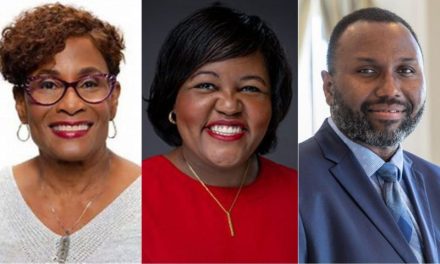On September 10, “To Life, L’Chaim — The Power of Conversation” takes place at the Wright Center on the Samford University campus, 800 Lakeshore Drive and will include a panel with Daryl Davis as well as music, spoken word and a community choir. (Provided)
” data-medium-file=”https://www.birminghamtimes.com/wp-content/uploads/2024/09/Daryl-Davis-Jonathan-Timmes-e1725497516484-300×278.jpg” data-large-file=”https://www.birminghamtimes.com/wp-content/uploads/2024/09/Daryl-Davis-Jonathan-Timmes-e1725497516484.jpg” tabindex=”0″ role=”button” />
By Sym Posey | The Birmingham Times
Daryl Davis knows about the power of change not just through conversation but also through music. He initially gained recognition as a jazz, blues and rock & roll musician performing with notable artists like Chuck Berry and many others. However, Davis is more widely known for his efforts to fight racism by engaging members of the Ku Klux Klan (KKK) and convincing dozens of Klansmen to leave and denounce the hate group.
On September 10, “To Life, L’Chaim — The Power of Conversation” takes place at the Wright Center on the Samford University campus, 800 Lakeshore Drive and will include a panel with Davis as well as music, spoken word and a community choir.
“I will be with a very good friend of mine who is a former Neo-Nazi and we will be talking about what causes people to get into these movements, how we can get them out of these movements, and how we can need to address these things,” Davis told The Times.
The program benefits the Alabama Holocaust Education Center.
Davis’s efforts deal with combatting hatred, promoting understanding, and preventing atrocities born out of prejudice and bigotry. He traces his work to an incident that happened when he was 10 years old.
Lessons In Race
Born in Chicago, Illinois, Davis spent much of his childhood living in various foreign countries and learned about the diversity of cultures. His parents, Bill and Iris Davis, served as foreign officers.
“They would get assigned to the American Embassy in a foreign country for two years, and then come back home in the States for a year or so and then you [would] get reassigned to another country,” he said. “Back and forth were the formative years of my life, starting at the age of 3 in 1961.”
“I did kindergarten, first, third, fifth and seventh grade in different countries. My classmates were from all over the world. The person sitting to my right would be from Nigeria, and the person in front of me was from Japan. The one behind me was from France, and to my left maybe Germany.”
He learned his earliest lesson about race on American soil, he said.
“Around or under the age of 10. I was one of two Black kids in the entire school Payson Park Elementary School (which no longer exists) in Belmont, Massachusetts. There was a little Black girl in 2nd grade, but I was in 4th grade, so of course my friends are 4th and 5th graders, and they were white.
“My male friends, many of them were members of the Cub Scouts, invited me to join, and so I did. This is 1968. I was the only Black Cub Scout in the area, and one time during a parade, some people threw rocks and bottles at me while I was marching with the Scouts it wasn’t everybody. Just four or five people out of a large crowd.”
(The Patriot Parade occurs between Lexington and Concord, Massachusetts and commemorates the route Paul Revere rode to alert Minuteman of the approach of British troops.)
Davis said he initially thought the people throwing objects didn’t like the scouts. “I didn’t realize I was the only scout that they were throwing things at …” he said.
When he got home, he learned why people were throwing rocks. “For the first time in my life, at the age of 10, my mom and dad sat me down and explained racism. I had never even heard the word ‘racism.’ I had no idea what they were talking about whatsoever. What they were saying made absolutely no sense,” recalled Davis, 66.
He continued, “My 10-year-old brain could not process the idea that somebody would want to hurt me for no other reason than the color of my skin, somebody who never even met me before. I felt like my parents had to be deceiving me. The people who were throwing things at me did not look any different to me than my fellow Americans overseas or my little French, Danish, Swedish, or Australian friends. It made no sense.”
Steppingstone
That the incident was the first steppingstone into what he would go on to do later in life, Davis said, which would include fighting against bigotry and promoting empathy and understanding.
He told C-Span in a 2017 interview, “I formed a question at the age of 10 in 1968, which was, ‘How can you hate me when you don’t even know me?’ And I’ve been seeking that answer [for more than 50 years] … and I bought books on Black Supremacy, white Supremacy, the Nazis in Germany, the neo Nazis over here, the Ku Klux Klan looking for the answer in these books and I couldn’t find it.”
As he got older Davis said, “I figured, ‘Well, who better to ask than someone who would join an organization that is reputed to believe that somebody else is inferior to whom that does not look like them or believe as they believe based on the color of their skin or their religious beliefs?” So I said, ‘I would seek out Klan members and ask them to answer the question and then I would get my answer.”
That led to a career in engaging with Ku Klux Klan members and other extremists to dismantle their beliefs addresses the same root causes of prejudice that led to the Holocaust. He seeks to reduce the hatred that can lead to large-scale violence and genocide by fostering dialogue and understanding.
“It’s important to the democracy of this country,” he said.
Rock Star
Davis attended Howard University in Washington D.C. where he earned a Bachelor of Music Degree and was a member of their Jazz Vocal Ensemble. As a vocalist, guitarist, composer, and “keyboardist extraordinaire” Davis has worked with music legends Chuck Berry, Jerry Lee Lewis, and B.B. King and Elvis Presley’s Jordanaires.
“It’s not an easy occupation in which you can make money unless you become well established. Here I am telling my parents I’m going to go and major in music and become a rock star or something. I’m 17 years old or so and they had a fit. They did not want me to do music. They both had master’s degrees. They knew how hard it was for Black people to get a job, regardless of how much education you have.”
But Davis found a way. He first met Berry at the University of Maryland sports arena and went on to work for the legend for 32 years. The first time working with him was “the same as the last time,” Davis said, “amazing. The man was a genius. Millions of people can say, ‘I play the guitar, I sing, I write songs’ but not many can say ‘I created a genre of music.’ Chuck Berry invented rock ‘n’ roll.
- WHO: Alabama Holocaust Education Center
- WHAT: To Life, L’Chaim Panel, music, community choir, spoken word
- WHEN: 6:30 p.m. Tuesday, Sept. 10
- WHERE: Wright Center Samford University 800 Lakeshore Drive Bham
- WEBSITE: ahecinfo.org
The Alabama Holocaust Education Center works to create a more just world through workshops, field trips, community programs and connecting with others, have trained more than 2,000 teachers, provide traveling exhibitions and many programs. –










